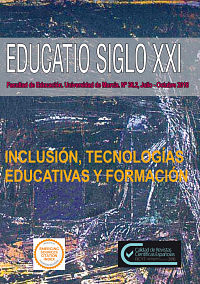La “uberización” de los centros escolares: reorganización del trabajo pedagógico mediante las plataformas digitales de contenidos
Resumen
El presente trabajo se inscribe en el marcode un proyecto de investigación de I+D
que estudia los cambios producidos en
los centros de Primaria por la progresiva
sustitución de los libros de texto por los
materiales digitales. Uno de esos cambios
observados es que los materiales digitales
se hacen operativos mediante plataformas
digitales que, además, se hacen exten-
sibles a otras muchas tareas de centro. A
partir de esta constatación nos ocupamos
aquí del estudio de la “uberización” o
reestructuración organizativa del trabajo
en los centros que operan con estas pla-
taformas. Para alcanzar tal objetivo hemos
recurrido a una metodología de corte cualitativo, tanto para el análisis de la presen-
tación de 15 plataformas digitales como
para el estudio de 4 centros de Primaria
usuarios de estas herramientas. Los resul-
tados apuntan a la plena implantación en
los centros de algún tipo de plataforma.
Su presencia introduce en los centros la
flexibilización, la atomización o la inten-
sificación del trabajo, además de sutiles
dispositivos de control tanto del profeso-
rado como de estudiantes. La provisiona-
lidad de estos primeros datos, nos sugiere
continuar trabajando en esta dirección a
fin de comprender mejor la naturaleza del
fenómeno y sus repercusiones en el fun-
cionamiento de los centros de Primaria.
Descargas
-
Resumen1337
-
PDF1250
Las obras que se publican en esta revista están sujetas a los siguientes términos:
1. El Servicio de Publicaciones de la Universidad de Murcia (la editorial) conserva los derechos patrimoniales (copyright) de las obras publicadas, y favorece y permite la reutilización de las mismas bajo la licencia de uso indicada en el punto 2.
2. Las obras se publican en la edición electrónica de la revista bajo una licencia Creative Commons Reconocimiento-NoComercial-SinObraDerivada 4.0 Internacional (texto legal). Se pueden copiar, usar, difundir, transmitir y exponer públicamente, siempre que: i) se cite la autoría y la fuente original de su publicación (revista, editorial y URL de la obra); ii) no se usen para fines comerciales; iii) se mencione la existencia y especificaciones de esta licencia de uso.
3. Condiciones de auto-archivo. Se permite y se anima a los autores a difundir electrónicamente las versiones pre-print (versión antes de ser evaluada) y/o post-print (versión evaluada y aceptada para su publicación) de sus obras antes de su publicación, ya que favorece su circulación y difusión más temprana y con ello un posible aumento en su citación y alcance entre la comunidad académica. Color RoMEO: verde.











